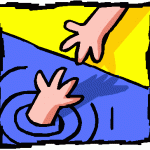There was an article in our local newspaper a couple of weeks ago that stated that the suburbs now have as many poor people as the city of Chicago. The number of poor in the suburbs has nearly doubled in 20 years from about 323,000 in 1990 to 630,000 in 2011, far outpacing overall population growth in the suburbs. It’s a trend researcher’s call “the suburbanization of poverty.” And this is not just here in Chicago; it’s a nationwide trend.
Poverty is defined based on income of less than $11,484 per year for a single person or less than $23,021 for a family of four. That’s living on $443 a week for rent, food, medicine, transportation, utilities, etc. I’m not sure how anyone can live on that amount in this area. Something has to be done!
Imagine this scene: a man dies and arrives before the Judgment Seat of God. God goes through the Book of Life and does not find the man’s name. So He tells the man that his place will be in hell. The man protests, “But what did I do? I did nothing!” God replies, “Precisely, that is why you are going to hell.”
In our readings today (Amos 6:1a, 4-7 and Luke 16:19-31) we are presented not so much with the rich and the poor, rather with those who deliberately turn their back on justice. In the gospel, the poor man Lazarus was at this rich man’s door. In other words the rich man couldn’t have missed him because he was right under his nose. And it says that ‘Lazarus would have gladly eaten the scraps that fell from the rich man’s table’, which implies that he was offered absolutely nothing, not even a small amount. So it’s not as if the rich man did a certain amount and it wasn’t enough. Jesus is telling us that he did absolutely nothing. That is why he lost out of heaven, not because he had riches. There is nothing wrong with having riches. What you do with it is what’s important.
Perhaps you might think that Lazarus could have got off his rear-end and done something for himself. But the fact that he ‘lay’ at the rich man’s door and that he was covered in sores, tells us that he was sick and helpless. One could even argue that God put him there deliberately to allow the rich man to help him, but he chose to do nothing. I have no doubt that God often puts people in our path who may need our help, but we always have the choice to help them or not. God gives us that freedom.
Maybe we are just too busy to notice the poor around us. And that, Jesus says, is the problem. It’s not what the rich man did. It’s what he didn’t do. The problem is not that he didn’t know, but that he knew and he didn’t care!
Life gets busy; trust me, I know. We as adults work hard all day. Many of us spend the evenings driving our kids to their various activities. I know how busy teens are with school, sports, homework, activities, etc. But here’s the thing we need to remember: Lazarus is here with us today! He’s the person at our workplaces that no one really connects with. He’s the lonely kid at school that no one wants to talk to. He’s the beggar on the street corner. He’s the hungry child who is going without another meal. These are the ones that Jesus challenges us to take care of for Him. We need to make it a part of our “busyness”, not something we try to fit in when we have time.
This is why in Youth Ministry we stress the importance of taking the teens on a mission trip: to let them see and understand what is going on in our society; to see the people that others ignore and how each one of us can make a difference in the lives of others. That is what a mission trip is all about. And that is our mission as well.
A man was praying as he walked down the street, and he came upon the crippled, the beggar and the beaten. And seeing them he cried, “God, how is it that a loving creator can see such things and yet do nothing about them?” God said, “I did do something. I made you.”
We all want to leave a legacy. We all want to make footprints in the sands of time. But we can’t make footprints in the sands of time if we’re sitting on our butts. And who wants to make buttprints in the sands of time?
It all begins with us! We simply cannot make excuses! It is our responsibility to take care of the poor. And the help we give people may not even be financial help. It may be something as simple as a smile or an encouraging word that is needed, or simply acknowledging someone.
So today, let us first thank God for what we have. And second, let us also ask God to help us make good use of what we have. Let each of us make a commitment to help those in need in any way that we can. It all begins with us. Let’s make sure that we do something about it!





